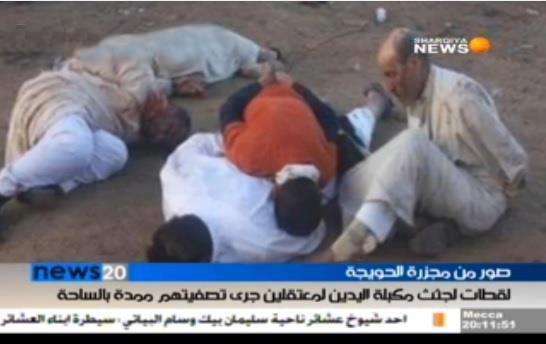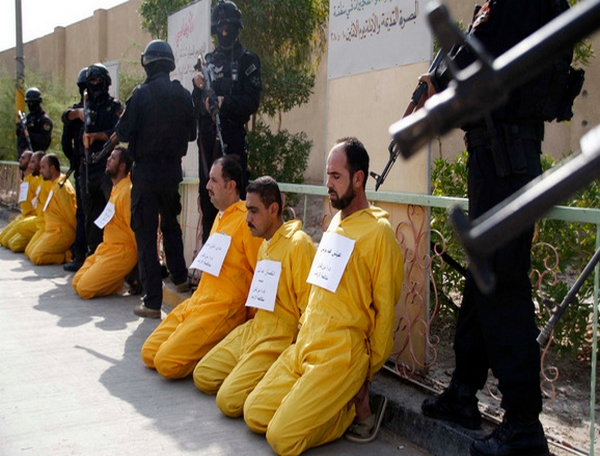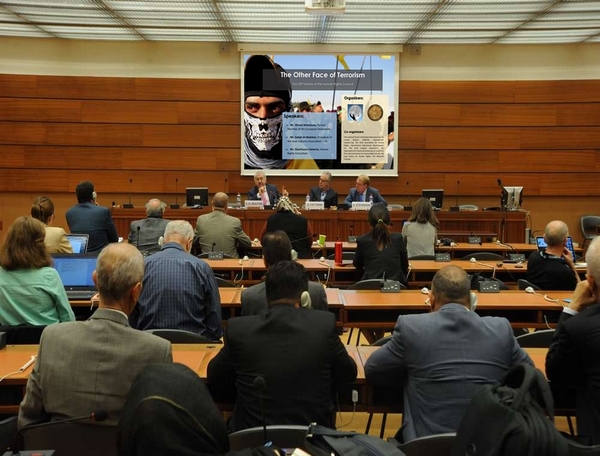23 Apr 2014
Al-Hawija one year after the massacre
Only justice can give satisfaction to the victims
April 23, 2014 marks the first anniversary of the al-Hawija massacre in Iraq, when at about 5 in the morning a peaceful sit-in came under an attack by government troops that left scores dead and injured and hundreds arrested. One year later justice for the victims has still not been found and human rights violations continue to take place on an even accelerated scale.

It was in the last week of April 2013 when around 4000 demonstrators peacefully gathered in a camp in the town of al-Hawija near Kirkuk/Iraq in order to express their frustration with the constant violations of their rights by the government of Nouri al-Maliki. Such demonstrations had grown geographically throughout the province of al-Anbar from December 2012 on, with hundreds of thousands of participants. Public criticism however, as peaceful as it might be, is a dangerous road to go vis-à-vis an oppressive government and those protestors in al-Hawija got a first-hand experience of the Iraqi government’s merciless iron fist against its own civilians.
Although the demonstrations had an official permission the demonstrators found themselves under siege from Friday 19, 2013 on by army troops, who prevented all access to food, water and medical aid. The Iraqi Minister of Education Mohammed Tamim desperately tried to avoid an escalation. In the afternoon of 22 April 2013 he offered direct negotiations between the demonstrators and government. Plans to attack the protesters however were already in place when Prime Minister al-Maliki responded, “You only have a few hours before the army storms the square.”
At around 1 a.m. on 23 April, just hours before the attack, Mr. Tamim asked the Iraqi Defense Minister, to be allowed to search the protest camp for allged weapons. Protesters agreed to have the grounds searched and to have any individuals that were wanted by the government arrested without objection. Mr. Tamim searched the protest camp for three hours but found no evidence of weapons. Demonstrators requested an extension until 12 p.m. to discuss the call of the army to remove their tents amongst themselves. When Mr. Tamim conveyed the message to the army commander, he replied “My orders are clear. I cannot give them more time.”
Although Mr. Tamim maintained constant communication with the Iraqi Prime Minister and the Defense Minister, a military operation was conducted at 5 a.m. Army troops stormed the camp and attacked protesters with live ammunition, tanks and helicopters. About fifty demonstrators were killed and 150 injured in the operation. Various testimonies confirmed that military forces even executed wounded protesters and ran over others with their trucks. Many were executed after being arrested. Army and government officials claimed that the attack was carried out in response to armed men at the protest opening fire on security forces, but wounded victim accounts have firmly sustained that this was not the case and affirmed that the Iraqi forces had recklessly opened fire on the demonstrators.
GICJ reported all the details regarding this massacre to the UN bodies based on first-hand information received from lawyers, NGOs and families of the victims. GICJ also brought the case to the attention of the High Commissioner for Human rights, Special Procedures and the Human Rights Council
In July 2013 GICJ met one of the victims, Thamer Hussein, whose 13-year old son was executed by the army forces in front of his eyes because he refused to leave his father alone, who was sitting in a wheelchair. Thamer Hussein testified that he begged the soldier to spare his son yet the soldier refused: “No, I will kill your son first and then you. This will serve you as a lesson.” He then took Thamer Hussein’s son and killed him right in front of his eyes before firing several bullets at him, following which he lost consciousness and was later brought to the hospital in critical condition. Mr Thamer Hussein affirmed that neither himself, a handicapped man, nor his son posed any danger at any moment.
Yanet Bahena from GICJ with Thamer Hussein in July 2013
The attack in al-Hawija was part of a larger plan to end protests in Iraq and is a flagrant example for the draconic response of al-Malik troops to any criticism.
Until this day no justice has been done for Mr Thamer Hussein and all the other innocent victims of al-Hawija. Although the government announced that it would form a fact-finding committee on the Hawija incident, and although the Chairman of the Human Rights Commission in the Iraqi House of Representatives, and member of the Commission of Inquiry on the events of Al-Hawija, himself stated on TV that the Commission is convinced of the involvement of Iraqi Armed Forces, senior officials in the massacre at Al-Hawija and their having issued orders to kill, so far investigations resulted in nothing, nobody has been held responsible, let alone convicted and there has been no international condemnation.
This is especially worrying in light of the fact that over the year Iraqi forces have expanded their operations to other Iraqi cities, putting thousands of innocent lives at risk. One of the worst examples is the crisis in the al-Anbar region since December 2013. Under the pretext that cities were infiltrated, government forces frequently imposed heavy restrictions of movement and stormed protest camps. The heavy shelling of civilian neighborhoods, including the use of heavy artillery, tanks and airplanes has reached a level where hundreds of innocents have already lost their lives and Iraq is facing the worst displacement crisis since 2008 by now.
On this day, the day of the 1st anniversary of the al-Hawija massacre GICJ one more time would like to take the opportunity and reiterate its call to the world that justice cannot be postponed. Justice must be done and be seen to be done. Only justice can give satisfaction to the victims, restore their dignity and make room for societal healing to take place.
What occurred on 23 April, 2013 at al-Hawija was a planned and carefully premeditated massacre by Prime Minister Maliki and his government, and therefore constitutes a crime against humanity. Military officials had been given orders to storm the demonstrator’s camp before any genuine negotiations could be carried out. Officials had a mission to kill and nothing would have changed that. Claims that demonstrators were armed and fired at security forces were false and unfounded.
Maliki, his government and his military officers therefore committed grave violations of human rights and international law, including against summary and arbitrary executions and the right to life; freedom from torture and inhumane and degrading treatment or punishment and freedom of peaceful assembly and of association.
This act of state terrorism and inhumanity cannot go unpunished. Maliki and all those who participated must be brought to justice. A message must be sent to Maliki that he will no longer be allowed to kill at will and with impunity.
In the name of all innocent victims GICJ calls on international community and all those committed to human rights that an international independent commission must be established in order to investigate the human rights violations committed by the Iraqi government and that all countries must exert all the political pressure on Prime Minister Nouri al-Maliki to end abusing the people of Iraq and halt all supply of military support of al-Maliki’s forces with weapons and technical equipment given that he uses them against innocent civilians.
Documenting and reporting human rights violations in Iraq
| Executions | Human Rights Violations in the context of fight against terrorism | Peaceful protests | ||||
 |
 |
 |
||||
 |
 |
 |
||||









